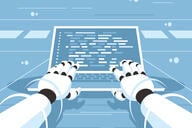You have /5 articles left.
Sign up for a free account or log in.
Emily Contois is a guest author and PhD student in American Studies at Brown University. She tweets @emilycontois and blogs on the intersections between food studies, public health, and nutrition in everyday American life at emilycontois.com.
William Buchan’s eighteenth-century health advice rings as true today as it did nearly 250 years ago, especially for those of us who often find ourselves seated squarely on our rears for what feels like endless amounts of time—which may quite literally be killing us.
While we at GradHacker offer tips for maintaining your health, staying active, finding time for the gym, and eating well during graduate school, Buchan’s domestic medicine manual, Domestic Medicine Or, a Treatise on the Prevention and Cure of Diseases By Regimen and Simple Medicines (1772, second edition) provides period recommendations for the studious.[1] Read today, his health advice is entertaining, enlightening, affirming, and worrisome in equal measure.
Buchan writes:
Intense thinking is so destructive to health, that few instances can be produced of studious persons who are strong and healthy, or live to an extremely old age. Hard study always implies a sedentary life; and, when intense thinking is joined to the want of exercise, the consequences must be bad…Man is evidently not formed for continual thought more than perpetual action, and would be as soon worn out by one as by the other.
Now that it’s sunk in that nothing is worse for your health—or less beneficial to society—than studying all day [dejected sigh], consider Buchan’s recommendations for promoting health among the studious:
Don’t sit all day. He warns that sitting “from morning till night” impairs digestion, the discharge of urine, liver and lung function, and causes gout. Unrelated to sitting, studying also causes sore eyes, especially when reading by candlelight, which “ought to be practiced as seldom as possible.”
Practice good posture. As if foreseeing the rise of standing and walking desks, Buchan urges studious people to pay attention to their posture, alternating between sitting and standing positions. Like Katie’s post on workspace ergonomics, Buchan also promotes proper ergonomic positioning while sitting as he warns, “Those who read or write too much are ready to contract a habit of bending forward and often press with their breast upon a table or bench. This posture cannot fail to hurt the lungs.”
Focus on your digestion. Food studies scholars, like myself, are doubly damned in that, “No person can enjoy health who does not properly digest his food. But intense thinking and inactivity never fail to weaken the powers of digestion.” Lest we get caught in a never-ending cycle of studying and poor digestion, Buchan encourages us to “never study too long at a time” and to eat regularly.
Strive for work-life balance. Buchan warns that our nerves are vulnerable to the effects of study, as “a delirium, melancholy, and even madness, are often the effect of close application to study.” [Ain't that the truth?] Thus, we must strive for work-life balance and fulfilling non-academic hobbies, because “[h]ardly any thing can be more preposterous than for a person to make study his sole business. A mere student is seldom an useful member of society.” [Even deeper dejected sigh.] Buchan recommends that the studious “engage in some employment or diversion,” such as horseback riding or walks.
Socialize with non-academic friends. Buchan frowns upon intellectual elitism, stating that while “learned men often contract a contempt for what they call trifling company,” it is imperative that those who consider themselves philosophers associate with “the cheerful and gay.”
Enjoy the great outdoors. While our studying often keeps us indoors in dark quarters, we must seek fresh air and sunshine at every opportunity, which refresh both mind and body.
Exercise regularly, and in the morning. While he admits that the morning is the best time to study, Buchan argues that we must first exercise, on an empty stomach no less. Notably, “It is not sufficient to take diversion only when we can think no longer.”
Listen to music. We ought to listen to music for it “has a very happy effect in relieving the mind when fatigued with study.” [So go ahead and link up those grant funds to your iTunes account—or test out some of Julie’s work soundtrack ideas.]
Avoid strong liquor. While borderline alcoholism and caffeine addiction (whether coffee or tea) are often hallmarks of academic careers, Buchan warns, “This indeed is a remedy; but it is a desperate one, and always proves destructive.” He assures that we shall undoubtedly be better served by recreational horseback riding than strong drink. But don’t lose heart; a suitable diet includes “fine malt liquor, not too strong, good cyder [sic], wine and water, or if troubled with acidities, water mixed with a little brandy.”
Eat in moderation. Consume “any kind of food that is wholesome,” but avoid “sour, windy [read gassy], and rancid foods.” We also ought to eat a light supper early in the evening.
So there you have it: 250-year-old health recommendations for the studious that are astoundingly on point for the twenty-first-century graduate school experience. No matter how many hundreds (or thousands!) of pages you have to read this week, complement your scholarly endeavors by listening to music, socializing with folks outside of the academic bubble, drinking weakly alcoholic beverages, strolling in the sunshine, and, of course, riding horses.
How do you ensure that an academic lifestyle is also good for your health? Share your favorite health tips for the studious in the comments!
[1] Here, in the NIH National Library of Medicine Digital Collections, you can read a beautifully uploaded copy of the eleventh edition of Domestic Medicine from 1789. Recommendations for the studious begin on page 61.
[Image by A. L. Leroy [Public domain], via Wikimedia Commons, cropped at bottom.]





